The Dallas Central Appraisal District has issued its proposed property valuations for the 2025 tax assessment cycle. In 2024, 36% of houses were overvalued. In 2025 the number of houses overvalued decreased by 28%, which provides relief to some homeowners. The average value of residential homes increased by 5.6%, whereas commercial real estate experienced a more notable rise of around 15.1%. These changes reflect the combined impact of both newly built properties and those already in existence.
Residential Tax Assessment Increased in 2025 by 5.6% in Dallas County
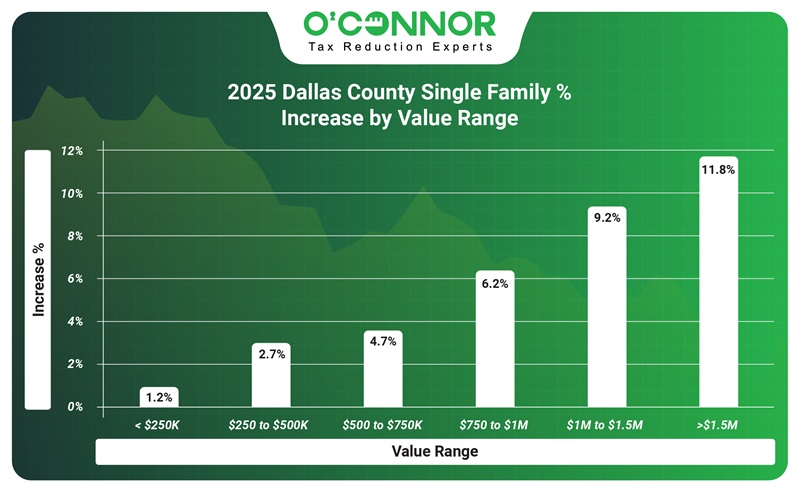
Residential properties exceeding $1.5 million experienced the highest growth, rising by 11.8% and reaching a projected market value of $69 billion in 2025. Notable appreciation was also seen in homes priced from $1 million to $1.5 million, which grew by 9.2%, while properties valued between $750,000 and $1 million saw a 6.2% increase. Homes valued less than $250k increased only by 1.2%
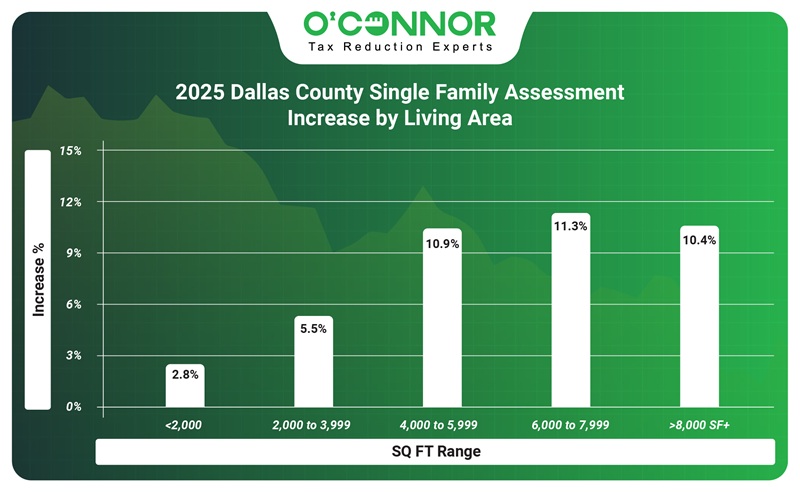
In 2024, the total value of all properties—regardless of size—rose from $241 billion to $278 billion, marking a 15% increase. By contrast, 2025 saw a more modest overall growth of 5.6%, with values climbing from $274 billion to $290 billion. Larger properties over 8,000 square feet, which are generally higher in value, experienced a 10.4% increase—down from the 20.9% surge seen in 2024. Among single-family homes in Dallas County, the smallest value gains were recorded in properties under 2,000 square feet, which rose by just 2.8%.
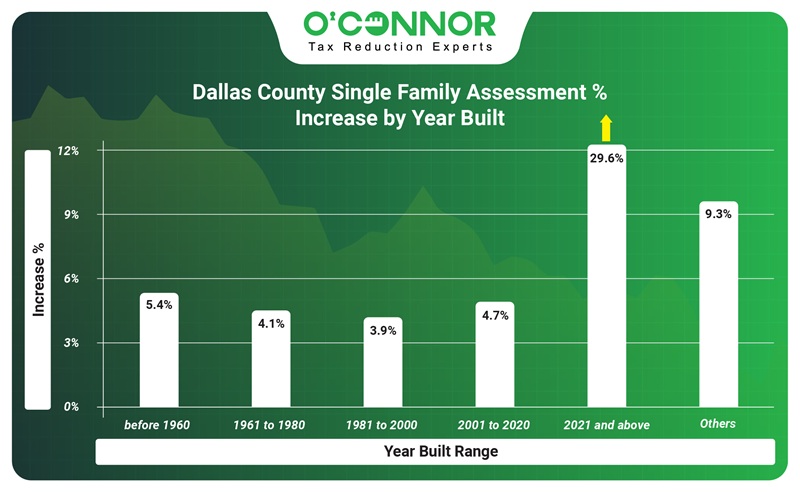
In the 2025 property tax reappraisals by the Dallas Central Appraisal District (CAD), homes constructed in 2021 or later saw the steepest increase in assessed value, rising by 29.6%. In contrast, for 2024, the highest assessments were recorded for properties without a listed construction year, categorized as “others.” By 2025, this category saw a more moderate increase of 9.3%. The smallest growth was observed among homes built between 1981 and 2000, which experienced a modest 3.9% rise in assessed value.
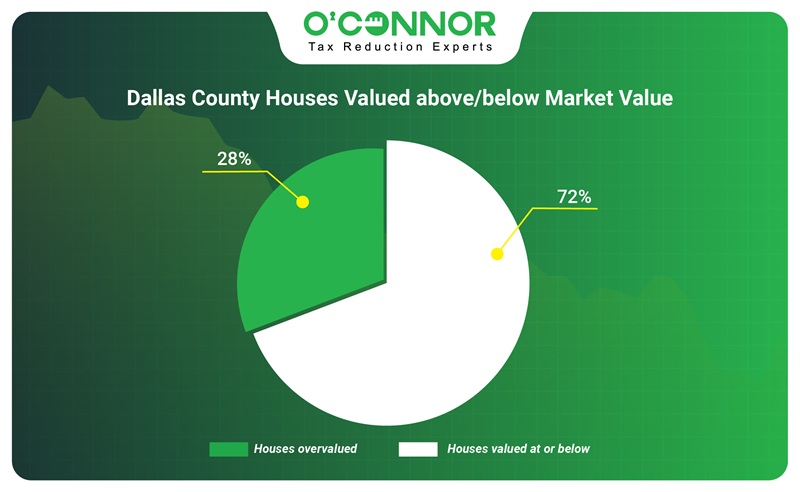
In 2024, Dallas CAD overvalued 52% of Dallas County homes. Fortunately, for homeowners this number went down to 28% and 9,361 houses were overvalued. Reports show that 72% or 23,770 houses were valued at market value or below.
Commercial Property in Dallas County Significantly Increased by 15.1%
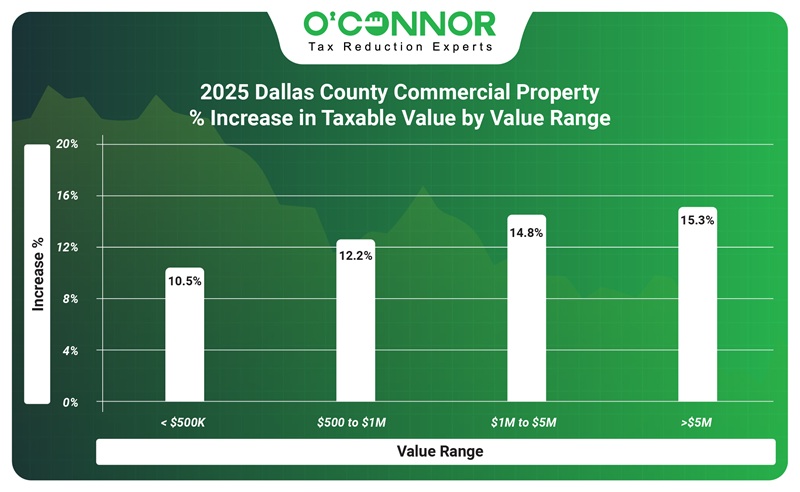
Dallas County’s commercial property assessments have experienced a substantial increase in all assessed value categories and value ranges during the 2025 tax year. The most significant growth was observed in commercial accounts valued at over $5 million, with a rate of 15.3%. Conversely, property priced below $500K experienced the lowest growth rate of 10.5%. Property valued between $1 million and $ 5 million saw a notable growth of 14.8%.
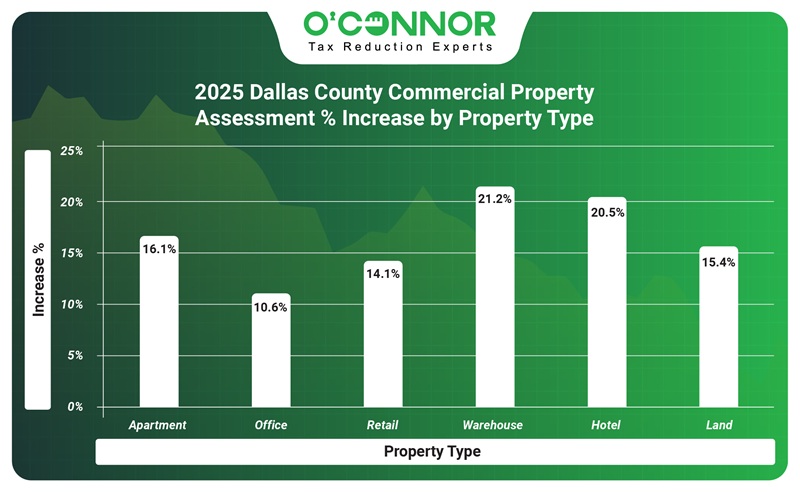
It appears that the commercial property values of property owners in Dallas County have experienced substantial increases in 2025. Warehouses experienced the most significant increase in property values, rising by 21.2% from $7.834 billion to $9.493 billion. Conversely, the value of office buildings experienced the smallest increase of 10.6% in value.
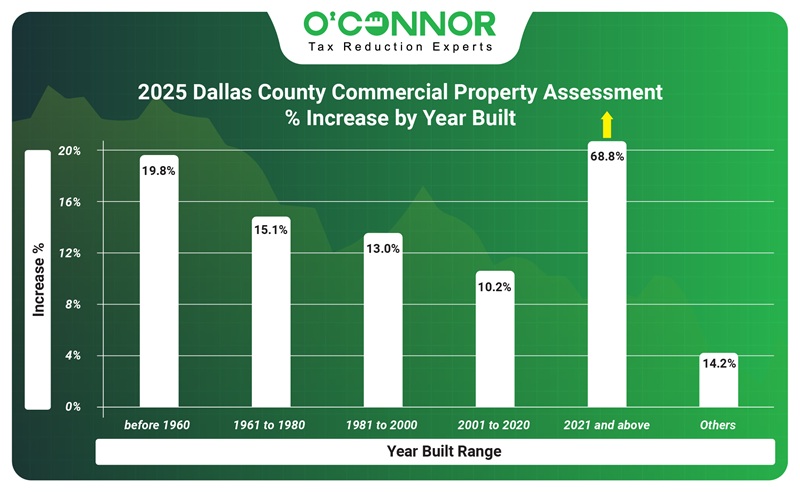
The commercial properties that were established in 2021 and subsequent years experienced the greatest recorded increase in value, with a gain of 68.8%, as opposed to 22.6% in 2024. The lowest growth was seen in commercial property built between 2001 and 2020 with 10.2%. Other property recorded with high increases includes those built before 1960 (19.8%) and built between 1961 to 1980 (15.1%).
Gap Between Dallas CAD Valuations and Wall Street Market Outlook
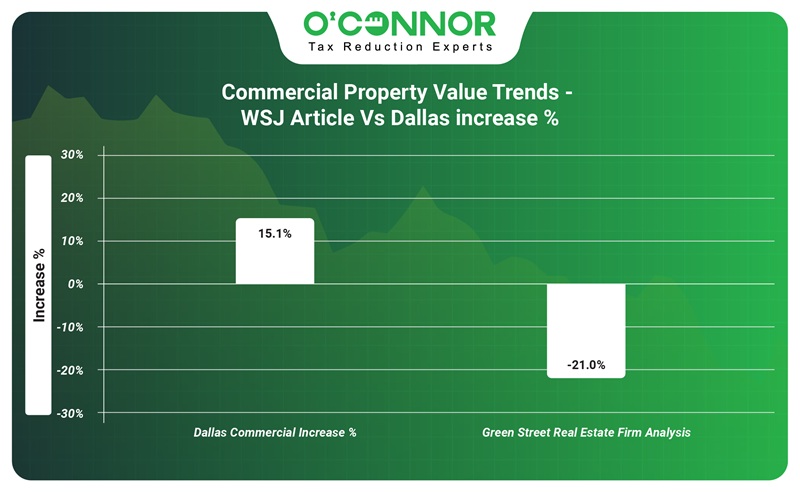
A notable discrepancy exists between the findings of Green Street Real Estate, a Wall Street firm, and the 2025 commercial property tax reassessment by Dallas CAD. While Dallas CAD reported a 15.1% increase in commercial property values, Green Street’s analysis showed a sharp decline of 21.0%.
Dallas County Apartment Property Increase
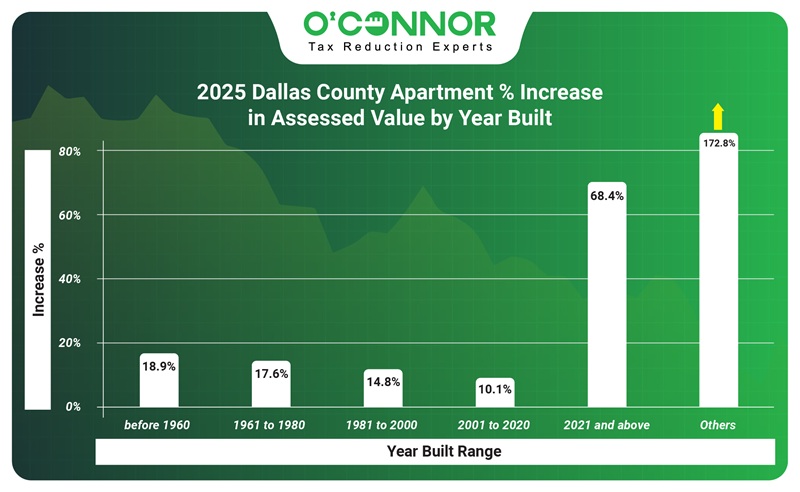
The combined property tax evaluations for apartment complexes in Dallas County had an increase of 16.1% in 2025, slightly lower than the 23.1% in 2024. The most notable rise was seen in apartment complexes categorized as “others,” seeing a 172.8% appreciation in value from $21 million to $57 million in the past year. The highest appreciation in value with a year-built category was seen buildings constructed in 2021 and later with 68.4%.
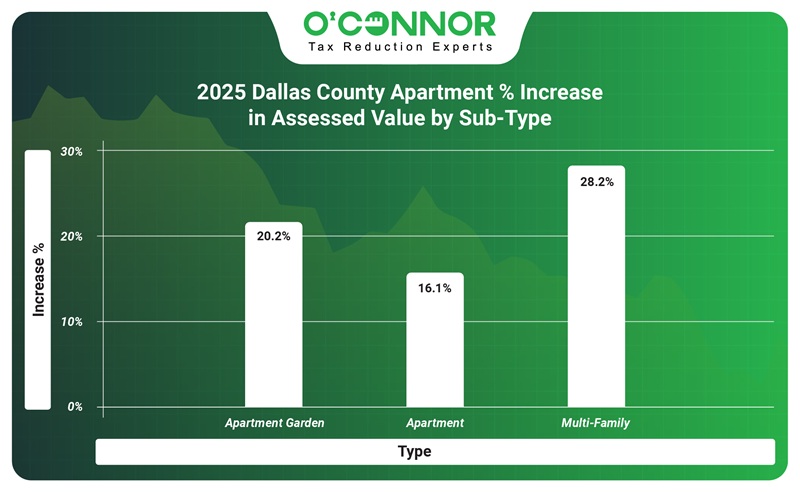
In 2025, the property tax assessments for various sub-types of apartment complexes in Dallas County increased. The multi-family apartment accounts experienced the most substantial growth, increasing from $868k to $1.113 million, a 28.2% increase. Apartment gardens also saw a high increase of 20.2% and had a 2025 notice market value of $1.760 million.
Dallas County Office Buildings Percentage Increase by Year Built
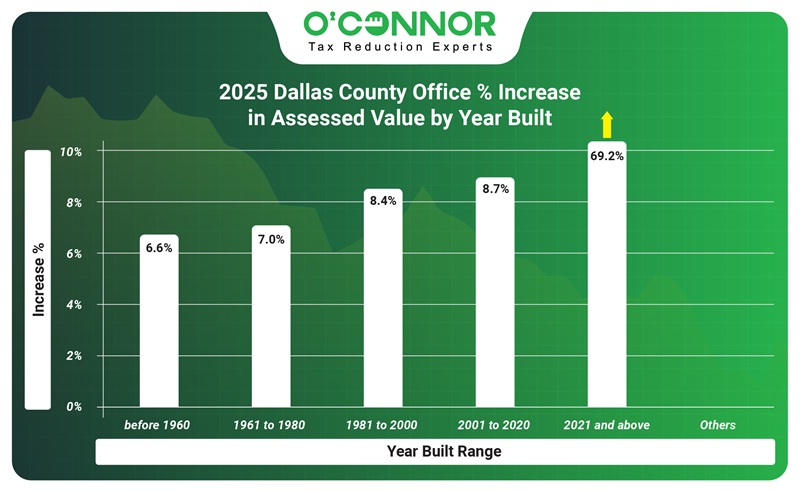
The Dallas CAD appears to have made the most significant increase for office property with a year built assigned. The year range of offices constructed in 2021 and later showed a tremendous increase of 69.2%. The office buildings built between 2001 and 2020 also saw a notable increase, with a rise of 8.7%. This “others” category stayed consistent at $612,530 in market value and had no increase. The average growth of assessed value for all categories of construction years has been around 10.6%.
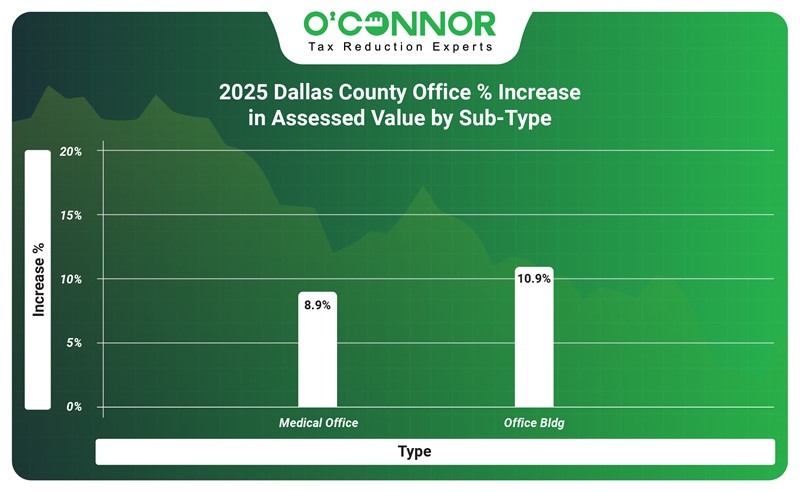
For office building in Dallas County, there are only two sub-types. Out of the two, regular office buildings had the greatest increase of 10.9%, growing in market value from $31 billion to $34 billion. Medical offices saw a growth of 8.9% with a notice market value in 2025 of $3.950 billion.
Dallas CAD Retail Tax Assessments Up by 14%
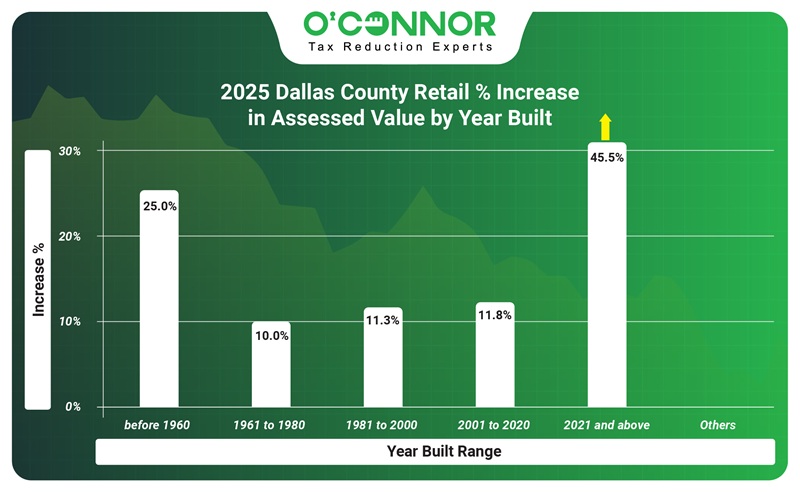
Statistically, the property tax assessments for retail buildings in Dallas County have increased in all construction year categories. The retail buildings that were constructed in 2021 and later experienced the greatest level of assessment growth, with a 45.5% increase in value from $187 million to $273 million. Property built before 1960 also saw a high increase of 25%. This year, the assessed value of retail properties constructed between 1961 and 1980 increased by 10.0%, the lowest rate of growth in this section of the analysis.
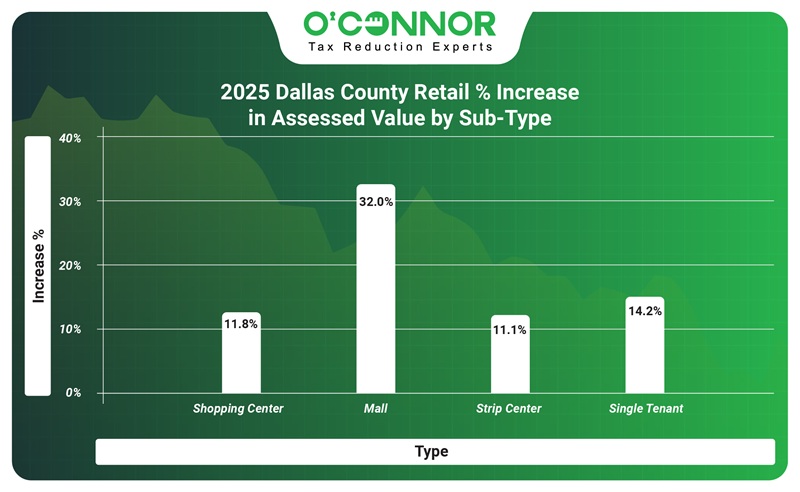
In 2025, the property tax assessments for retail property categories in Dallas County increased. The retail center experienced the lowest amount of assessed value, with a relatively low 11.1% growth rate in 2025 assessments. The retail properties in mall centers have experienced the most significant increase, with a 32% increase.
Dallas CAD Warehouse Tax Assessments Up About 14%
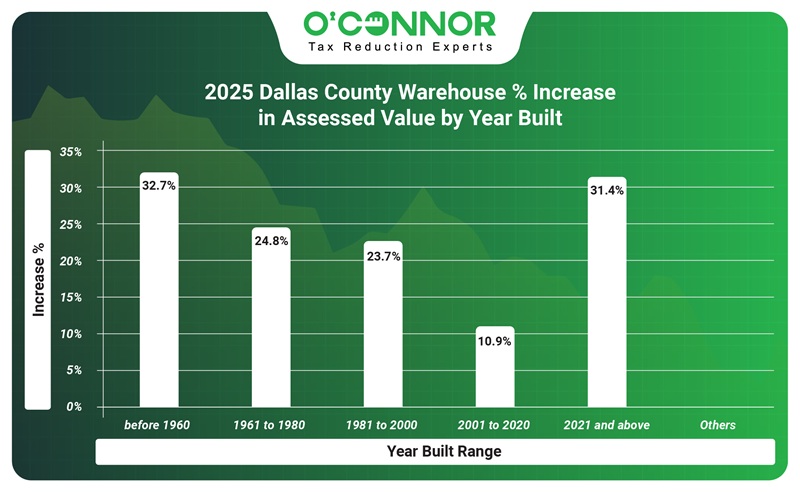
Between 2024 and 2025, property tax assessments for warehouse owners in Dallas County rose by an average of 21.2%. Warehouses built before 1960 experienced particularly strong appreciation, with their value climbing from $707 million to $938 million—a 32.7% increase. Similarly, warehouse properties without a recorded construction date saw a comparable market value jump of 31.4%.
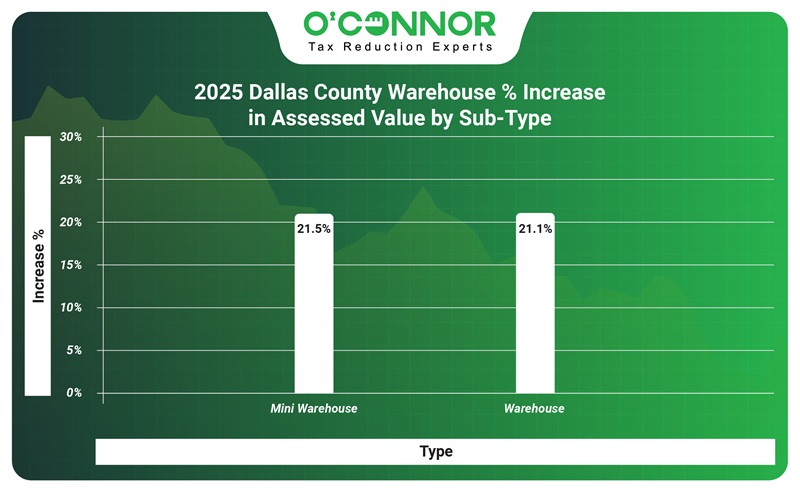
The Dallas Central Appraisal District reported a 21.2% overall rise in market values for two categories of warehouse properties. Both warehouse sub-types increased at very similar rates. Mini warehouses increased by 21.5% and regular warehouses increased by 21.2%.
Tracking the Gap: Dallas Metro Home Value Growth vs. County Assessments
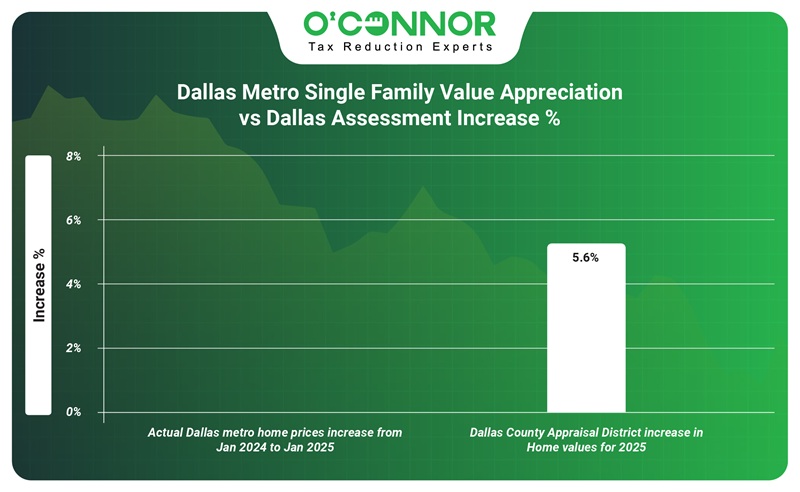
In 2025, the Dallas Central Appraisal District (CAD) bumped up single-family home values by 5.6% — a noticeable slowdown from the 15.2% spike seen in 2024. Meanwhile, real-world market trends painted a much tamer picture. According to the MetroTex Association of Realtors, Dallas Metro home prices crept up by just 0.3%, even lower than the 1.9% rise recorded the previous year. The numbers suggest a growing divide between official assessments and actual market movement.
A Fresh Look: 2025 Dallas CAD Property Tax Revaluation Summary
In 2025, the Dallas Central Appraisal District (CAD) rolled out its latest property tax revaluations. Property values are on the rise across the board, but commercial real estate is leading the charge. Residential properties saw a modest 5.6% uptick, while commercial properties jumped a striking 15.1% in overall market value.
When comparing the CAD figures to actual market trends, there’s a noticeable gap. Dallas home prices only inched up by 0.3% between January 2024 and January 2025, casting some doubt on the accuracy of the CAD’s 5.6% hike for homes. However, only 28% of properties are considered overvalued, with the majority—78%—falling at or below market value.

